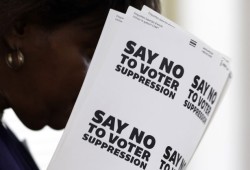
The law, passed in 2011, requires voters to present one of seven potential forms of identification before they were allowed to cast their vote. Concealed handgun permits made the short list of acceptable identification. Out-of-state driver’s licenses and student identification cards, however, did not.
Civil rights advocates challenged Texas’ restrictive voter identification law, claiming it was discriminatory and created an unconstitutional burden on the right to vote. The district court sided with civil rights advocates and determined that voter suppression was indeed part of the motivation behind the voter identification measure and that the law should not go into effect. However, on appeal, the U.S. Court of Appeals for the Fifth Circuit ruled that the law should not be overturned so close to the midterm election as this could cause confusion among voters. The Supreme Court denied a stay of the Fifth Circuit’s decision, allowing the law to go into effect.
The Supreme Court’s decision, like the Fifth Circuit’s, might have been based solely on timing and the proximity of the election.
Proponents of Texas’s voter identification law claim these new requirements are simply a minor inconvenience necessary to protect against voter fraud. But as Justice Ginsberg highlights in her dissent to the Supreme Court’s decision to let the law go into effect, this case has major implications for American democracy. Justice Ginsburg writes, “[t]he greatest threat to public confidence in elections in this case is the prospect of enforcing a purposefully discriminatory law, one that likely imposes an unconstitutional poll tax and risks denying the right to vote to hundreds of thousands of eligible voters.” Moreover, the law was proposed to “solve” a problem that never existed. Texas does not have an issue with voter fraud. In fact, in the last decade, only one voter fraud case had been prosecuted to conviction. Texas does, however, have a well-documented history of voter suppression, particularly for voters of color. In every redistricting cycle since 1970, Texas has been found violating the Voting Rights Act. Their current voter ID law could disenfranchise at least 600,000 voters, mainly Latino and black voters.
This ruling will have a disproportionate impact on those who are most vulnerable in our community. Older adults and people of color are disproportionately impacted by these voter ID laws as it is not uncommon for these groups to not have access to the type of identification required by these laws or have the means to obtain them. The usual fees associated with obtaining these documents (i.e. birth certificates, marriage certificate, court orders, etc.) can be cost prohibitive to low-income and indigent members of our community. Also, members of our community who live in rural areas can face difficulties getting to a DMV to obtain the required identification. Approximately one-third of Texas’s counties do not have a DMV, requiring long commutes for rural voters, assuming they have the time and means before the midterm election. These laws are also a problematic for our transgender community. Such restrictive voter ID laws are usually coupled with increased harassment of transgender voters who face obstacles obtaining identification congruent with their gender identity.
Following the Supreme Court’s 2013 decision in Shelby County v. Holder, it has become significantly more difficult to protect the right of people of color to vote. That case gutted the Voting Rights Act and essentially made it more difficult for discriminatory voter suppression laws like this to be struck down. The LGBTQ community must recognize the importance of this and other racial justice fights in order to truly represent LGBTQ people of color.
The Supreme Court will likely hear this voter ID case again in the future. But by that time, it will be too late to make a difference in this year’s midterm election. Early voting has already begun in Texas. Similar laws are also going into effect in North Carolina and Ohio. Given the Supreme Court’s unfortunate trend of chipping away at minority voting rights and their hesitation to protect these rights in crunch time, our best hope is to elect officials who will not play these types of discriminatory games with our voting rights.









